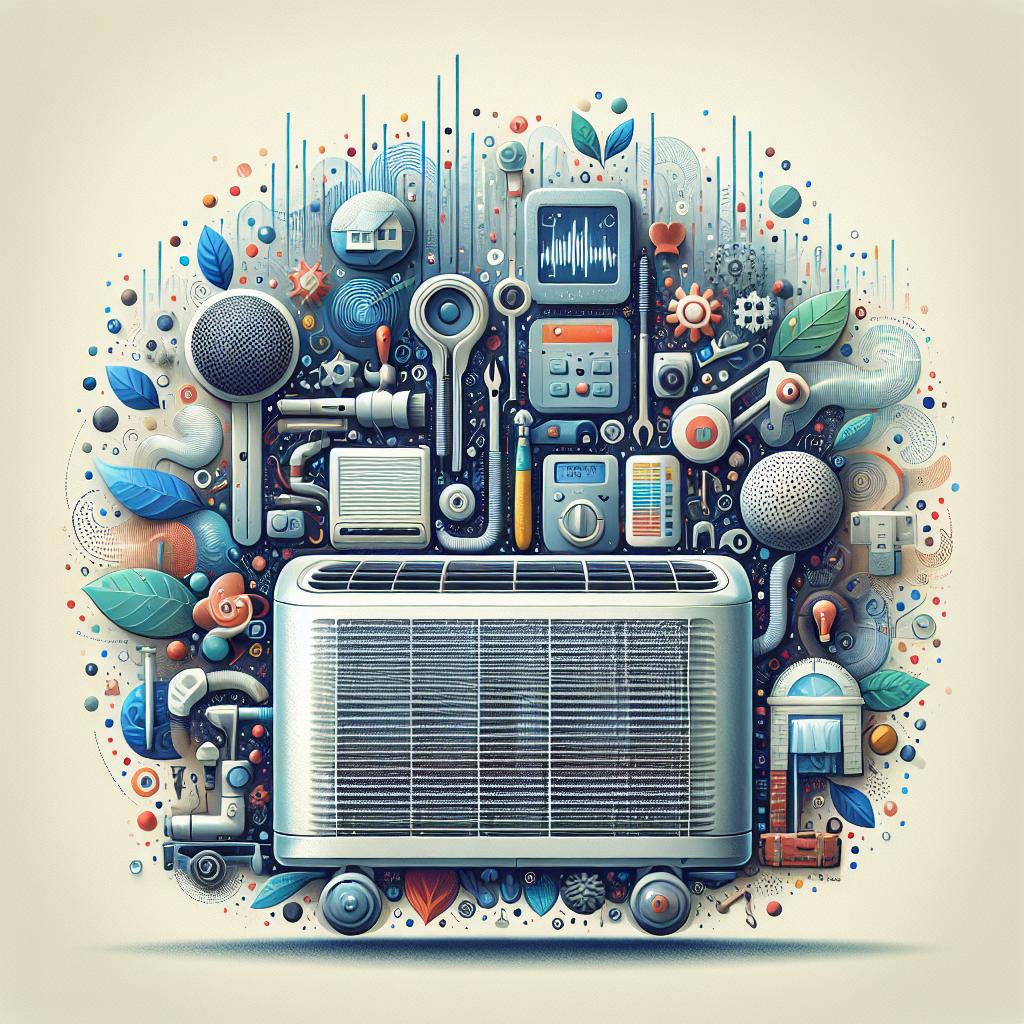As the sweltering heat of summer creeps in, the hum of an air conditioning unit often becomes the soundtrack of productivity in commercial spaces. However, for many business owners, the comfort of a cool, controlled habitat can quickly turn into a nightmare when air conditioning problems arise. from fluctuating temperatures to unexpected breakdowns, issues can not only disrupt the workplace but also impact employee morale and customer satisfaction. In this article, we will explore some of the most common air conditioning problems encountered in commercial settings and provide practical solutions to ensure your cooling system continues to run smoothly. Whether you’re managing a bustling office, a retail store, or any other commercial facility, understanding these potential pitfalls and learning how to address them can definitely help create a more pleasant and efficient environment for everyone.
Identifying unusual Noises: What Your AC is Trying to Tell You
Every unusual sound your air conditioning unit makes can be a signal that something is amiss. Listen closely for these typical noises and what they might indicate about your system’s health:
- Banging or Clunking: This could mean a loose or broken part inside the unit, possibly leading to further damage if not addressed.
- Hissing: Often a sign of a refrigerant leak, hissing should be investigated promptly to maintain efficiency and prevent costly repairs.
- Squealing: A high-pitched sound may indicate worn-out or loose fan belts, which could ultimately lead to cooling failure.
- Buzzing: This might suggest electrical issues or an obstructed fan, requiring immediate attention to avoid more serious complications.
To dial into these sounds and their meanings even further, consider this handy guide:
| Noise | Possible Cause | Recommended Action |
|---|---|---|
| Banging | Loose parts | Tighten or replace components |
| Hissing | Refrigerant leak | Professional repair needed |
| squealing | Worn fan belts | Replace belts |
| Buzzing | Electrical problems | check connections; consult an electrician |
Understanding Temperature Imbalance: Causes and Solutions
Temperature imbalance in commercial spaces can often arise from several factors. One of the primary causes is the inadequate sizing of the HVAC system, where either an oversized or undersized unit fails to evenly distribute air. Additionally, poor insulation and air leaks can contribute considerably, allowing hot or cold air to infiltrate the building, resulting in uneven temperatures across different areas. Other common issues include obstructed vents, which restrict airflow, and insufficient regular maintenance, leading to the buildup of dust and grime that can further hamper air circulation.
Addressing these imbalances effectively requires a multifaceted approach. First, conducting a thorough HVAC assessment is crucial to determine the appropriate system size and capability. implementing solutions such as proper insulation,sealing air leaks,and ensuring unobstructed vents can dramatically improve temperature consistency. Regular maintenance, including filter changes and duct cleaning, will help maintain system efficiency. Consider using the table below to summarize potential solutions:
| Issue | Solution |
|---|---|
| inadequate HVAC sizing | Full system assessment and sizing adjustment |
| Insulation problems | Enhance thermal insulation and seal gaps |
| Obstructed vents | Clear obstructions and ensure airflow |
| Lack of maintenance | Implement regular maintenance schedules |

Addressing Drainage Issues: Preventing Water Damage in Your Space
When it comes to air conditioning systems in commercial spaces, addressing drainage issues is critical for maintaining a comfortable and safe environment. Clogged condensate lines can lead to water backups, resulting in not only water damage to the building but also potential mold growth. Regular maintenance is essential to prevent such issues.Here are some strategies to keep drainage systems functioning properly:
- Regular Cleaning: Schedule routine cleanings of condensate lines to remove any debris.
- Flushing the System: Use a mixture of vinegar and water monthly to help break down buildup.
- Installing Drain Pan Maintenance Alerts: These alerts can notify staff if there’s an overflow before a meaningful issue arises.
Additionally, ensure that the installation of the air conditioning unit adheres to proper grading and positioning. A well-structured drainage system not only helps in preventing leaks but also extends the longevity of the air conditioning unit. Consider implementing the following measures to enhance your drainage setup:
| Measure | Description |
|---|---|
| Correct Grading | ensure the unit is slightly tilted towards the drainage outlet. |
| PVC Piping | Use rigid piping to avoid bends that can trap water. |
| Regular Inspections | Conduct checks for any signs of water leakage around the unit. |

Maintaining Air Quality: Tips for Ensuring a Healthy Environment
Ensuring optimal air quality in commercial spaces frequently enough involves regular maintenance of air conditioning systems. Neglected AC units can lead to increased levels of indoor air pollutants, which can adversely affect the health of occupants. Here are some practical tips to enhance air quality thru proper AC maintenance:
- Regular Filter Changes: Replace or clean air filters every 1-3 months to prevent dust and allergens from circulating.
- Schedule Professional Inspections: Engage HVAC professionals for routine inspections to catch issues early and ensure efficient operation.
- Keep Vents unobstructed: Ensure that air vents are clear of furniture or other objects to allow for proper airflow.
It’s equally important to monitor humidity levels, as excess moisture can promote mold growth, while overly dry air can irritate respiratory systems. Maintaining balanced humidity contributes significantly to a healthier indoor environment. Consider the following approaches:
| Humidity Level | Effects | Solutions |
|---|---|---|
| 30-50% | Comfortable and healthy | N/A |
| Below 30% | Dry skin, respiratory issues | Use humidifiers |
| Above 50% | Mold growth, discomfort | Dehumidifiers, increased ventilation |
Q&A
Q&A: Common Air Conditioning Problems in Commercial Spaces and How to Fix Them
Q: What are some common air conditioning problems found in commercial spaces?
A: Commercial air conditioning systems can often experience issues such as inadequate cooling, refrigerant leaks, unusual noises, erratic thermostat readings, and frequent cycling on and off. these problems can disrupt not only employee comfort but also business operations,making it crucial to address them promptly.
Q: Why does my commercial space feel warm and uncomfortable even with the AC running?
A: If your air conditioning system is running but the space remains warm, it could be due to several factors. The most common culprits include clogged air filters, blocked ductwork, or an undersized AC unit for the area it’s meant to cool. Start by checking and replacing air filters, and if the issue persists, consider an HVAC professional to assess your ductwork and system capacity.
Q: How can refrigerant leaks impact my air conditioning system?
A: Refrigerant leaks reduce the efficiency of your air conditioning unit, leading to increased energy costs and diminished cooling. Additionally, low refrigerant levels can damage the compressor, resulting in costly repairs. If you suspect a leak, it’s best to consult a certified technician who can locate and repair it, and recharge the system as necessary.
Q: What does it mean if my AC unit makes strange noises?
A: Unusual noises such as banging, clanking, or hissing can indicate various issues. Banging sounds might suggest loose components, while a hissing noise frequently enough points to refrigerant leaks. Grinding noises can indicate motor problems. If you hear any strange sounds, it’s crucial to turn off the system and contact an HVAC technician to diagnose and resolve the issue before it escalates.
Q: My thermostat seems to read the wrong temperature.How can I fix this?
A: A malfunctioning thermostat can lead to discomfort and inefficient energy use. Ensure that it’s not placed near heat sources such as direct sunlight, lamps, or appliances that may skew its readings. Also, check the battery and wiring connections. If the problem continues, it may be time to recalibrate or replace the thermostat altogether.
Q: What does it mean if my AC unit frequently cycles on and off?
A: Frequent cycling, also known as short-cycling, can stem from issues such as an oversized system, clogged air filters, or problems with the thermostat. An oversized unit cools the space too quickly, causing it to shut off before it can adequately dehumidify the air. Regular maintenance, including changing filters and inspecting the system, can often resolve this issue.
Q: How frequently enough should I schedule maintenance for my commercial air conditioning system?
A: To keep your air conditioning system running efficiently, it’s recommended to schedule maintenance at least twice a year—once before the cooling season and once before the heating season. Regular maintenance can identify potential issues before they become serious problems, extending the life of your system and ensuring optimal performance.
Q: When should I consider replacing my commercial air conditioning unit?
A: If your unit is over 15 years old, requires frequent repairs, or struggles to maintain the desired temperature, it may be time for a replacement. Additionally, if your energy bills have increased significantly with little enhancement in comfort, upgrading to a newer, energy-efficient model can save you money in the long run and improve your building’s indoor air quality.
Insights and Conclusions
As we conclude our exploration of common air conditioning problems in commercial spaces, it’s clear that proactive maintenance and prompt attention to issues are the keys to keeping your indoor environment comfortable and efficient. From clogged filters to refrigerant leaks, each problem, while frustrating, presents an opportunity for improvement and optimization. By staying vigilant and addressing these concerns swiftly, you not only extend the lifespan of your air conditioning system but also ensure a healthier, more productive atmosphere for everyone within your walls.
Remember, knowledge is power.Equip yourself and your team with the insights shared in this article, and don’t hesitate to reach out to professionals when the challenge seems too daunting. A well-functioning air conditioning system not only enhances the comfort of employees and customers alike but also contributes to the overall success of your business. So, embrace the journey of maintaining your cooling systems—because when it comes to air conditioning, a little attention today can make a world of difference tomorrow.

